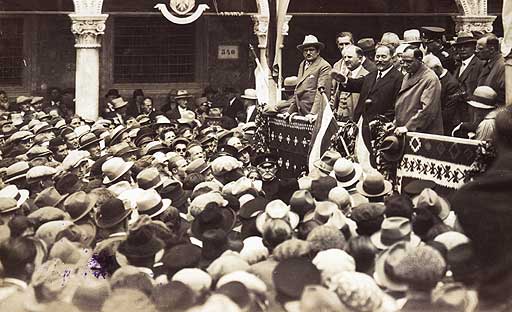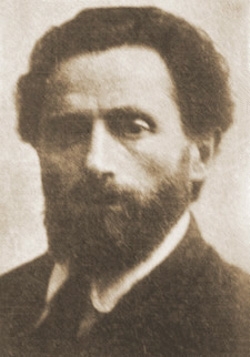|
Krestintern
The Peasant International (russian: Крестьянский Интернационал), known most commonly by its Russian abbreviation Krestintern (Крестинтерн), was an international peasants' organization formed by the Communist International (Comintern) in October 1923. The organization attempted to achieve united front relations with radical peasant parties in Eastern Europe and Asia, without lasting success. After failing to make headway with important initiatives in Bulgaria, Yugoslavia, and China in the 1920s, the organization was placed on hiatus at the end of the decade. The so-called Red Peasant International was formally dissolved in 1939. Organizational history Background The idea for a Red Peasant International is commonly credited to Polish Communist Tomasz Dąbal, a former member of the Polish Peasant Party and representative elected to the Polish parliament.Graeme Gill, "Peasant International," in George Jackson and Robert Devlin (eds.), ''Dictiona ... [...More Info...] [...Related Items...] OR: [Wikipedia] [Google] [Baidu] |
Communist International
The Communist International (Comintern), also known as the Third International, was a Soviet-controlled international organization founded in 1919 that advocated world communism. The Comintern resolved at its Second Congress to "struggle by all available means, including armed force, for the overthrow of the international bourgeoisie and the creation of an international Soviet republic as a transition stage to the complete abolition of the state". The Comintern was preceded by the 1916 dissolution of the Second International. The Comintern held seven World Congresses in Moscow between 1919 and 1935. During that period, it also conducted thirteen Enlarged Plenums of its governing Executive Committee, which had much the same function as the somewhat larger and more grandiose Congresses. Joseph Stalin, leader of the Soviet Union, dissolved the Comintern in 1943 to avoid antagonizing his allies in the later years of World War II, the United States and the United Kingdom. It was ... [...More Info...] [...Related Items...] OR: [Wikipedia] [Google] [Baidu] |
Croatian People's Peasant Party
The Croatian Peasant Party ( hr, Hrvatska seljačka stranka, HSS) is an agrarian political party in Croatia founded on 22 December 1904 by Antun and Stjepan Radić as Croatian Peoples' Peasant Party (HPSS). The Brothers Radić believed that the realization of Croatian statehood was possible within Austria-Hungary, but that it had to be reformed as a Monarchy divided into three equal parts – Austria, Hungary, Croatia. After the creation of Kingdom of Yugoslavia in 1918, Party requested for the Croatian part of the Kingdom to be based on self-determination. This brought them great public support which culminated in 1920 parliamentary election when HPSS won all 58 seats assigned to Croatia. In 1920, disgruntled with a bad position of Croats in the Kingdom, the party changed its name into Croatian Republican Peasant Party (HRSS) and started advocating secession from the Kingdom and the establishment of ''"peaceful peasant Republic of Croatia"''. On 1923 and 1925 election, HRSS ... [...More Info...] [...Related Items...] OR: [Wikipedia] [Google] [Baidu] |
Aleksandr Petrovich Smirnov
Aleksandr Petrovich Smirnov (born in 1877 in the village of Nikola, in the Tver province – on February 9, 1938) Was a Russian Old Bolshevik, revolutionary and Soviet statesman. Born in to a peasant family, he later became a factoryworker. He became a member of the League of Struggle for the Emancipation of the Working Class in 1896. Smirnov was elected as a candidate member of the Central Committee of the RSDLP in 1907 and 1912. In 1917 he became chairman of the soviet in Bogorodsk (present-day Noginsk), and a member of the presidium of the soviet of Moscow province. From 1919 to 1922 he was Deputy People's Commissar for Food, and from 1923 to 1928 he was People's Commissar for Agriculture of the RSFSR and, at the same time, general secretary of the Peasant International. He aligned himself with Joseph Stalin in the early 1920s. However, in 1933 he was expelled from the Central Committee, for his participation, together with Nikolai Eismont and Vladimir Tolmachev, in the R ... [...More Info...] [...Related Items...] OR: [Wikipedia] [Google] [Baidu] |
Vasil Kolarov
Vasil Petrov Kolarov ( bg, Васил Петров Коларов; 16 July 1877 – 23 January 1950) was a Bulgarian communist political leader and leading functionary in the Communist International (Comintern). Biography Early years Kolarov was born in Şumnu, Ottoman Empire (now Shumen, Bulgaria) on 16 July 1877, the son of a shoemaker.Branko Lazitch with Milorad M. Drachkovitch, ''Biographical Dictionary of the Comintern: New, Revised, and Expanded Edition.'' Stanford, CA: Hoover Institution Press, 1986; pg. 224. After graduating from high school in Varna, he worked as a teacher in Nikopol from 1895 to 1897. In 1897, Kolarov joined the Bulgarian Workers' Social Democratic Party (BWSDP). Kolarov studied law in Aix-en-Provence, France, and at the University of Geneva. Following his graduation in 1900, Kolarov worked as a lawyer in his hometown and, from 1904, in Plovdiv. Political career After the ideological split of the BWSDP, Kolarov cast his lot with Dimitar Blagoev's ... [...More Info...] [...Related Items...] OR: [Wikipedia] [Google] [Baidu] |
Executive Committee Of The Communist International
The Executive Committee of the Communist International, commonly known by its acronym, ECCI (Russian acronym ИККИ), was the governing authority of the Comintern between the World Congresses of that body. The ECCI was established by the Founding Congress of the Comintern in 1919 and was dissolved with the rest of the Comintern in May 1943. Organizational history Establishment The Communist International was established at a gathering convened in Moscow at the behest of the Russian Communist Party (Bolsheviks). As early as December 24, 1918, a radio appeal had been issued by the ruling party of Soviet Russia calling on "communists of all countries" to boycott any attempts of reformists to reestablish the Second International, but to instead "rally around the revolutionary Third International." The formal call for a conference of revolutionary socialist political parties and radical trade unions espousing revolutionary industrial unionism had been issued on January 24, 1919, wit ... [...More Info...] [...Related Items...] OR: [Wikipedia] [Google] [Baidu] |
Stjepan Radić (2)
Stjepan Radić (11 June 1871 – 8 August 1928) was a Croat politician and founder of the Croatian People's Peasant Party (HPSS), active in Austria-Hungary and the Kingdom of Serbs, Croats and Slovenes. He is credited with galvanizing Croatian peasantry into a viable political force. Throughout his entire career, Radić was opposed to the union and later Serb hegemony in Yugoslavia and became an important political figure in that country. He was shot in parliament by the Serbian People's Radical Party politician Puniša Račić. Radić died several weeks later from a serious stomach wound at the age of 57. This assassination further alienated the Croats and the Serbs and initiated the breakdown of the parliamentary system, culminating in the 6 January Dictatorship of 1929. Biography Early life Stjepan Radić was born in Desno Trebarjevo, Martinska Ves near Sisak in the Kingdom of Croatia-Slavonia within Austria-Hungary as the ninth of eleven children. After being expelled ... [...More Info...] [...Related Items...] OR: [Wikipedia] [Google] [Baidu] |
Profintern
The Red International of Labor Unions (russian: Красный интернационал профсоюзов, translit=Krasnyi internatsional profsoyuzov, RILU), commonly known as the Profintern, was an international body established by the Communist International (Comintern) with the aim of coordinating communist activities within trade unions. Formally established in 1921, the Profintern was intended to act as a counterweight to the influence of the so-called "Amsterdam International", the social democratic International Federation of Trade Unions, an organization branded as class collaborationist and an impediment to revolution by the Comintern. After entering a period of decline in the middle 1930s, the organization was finally terminated in 1937 with the advent of the Popular Front. Organizational history Preliminary organization In July 1920, at the behest of Comintern head Grigory Zinoviev, the 2nd World Congress of the Communist International established a temporary ... [...More Info...] [...Related Items...] OR: [Wikipedia] [Google] [Baidu] |
New Economic Policy
The New Economic Policy (NEP) () was an economic policy of the Soviet Union proposed by Vladimir Lenin in 1921 as a temporary expedient. Lenin characterized the NEP in 1922 as an economic system that would include "a free market and capitalism, both subject to state control", while socialized state enterprises would operate on "a profit basis". The NEP represented a more market-oriented economic policy (deemed necessary after the Russian Civil War of 1918 to 1922) to foster the economy of the country, which had suffered severely since 1915. The Soviet authorities partially revoked the complete nationalization of industry (established during the period of war communism of 1918 to 1921) and introduced a mixed economy which allowed private individuals to own small and medium sized enterprises, while the state continued to control large industries, banks and foreign trade. In addition, the NEP abolished ''prodrazvyorstka'' (forced grain-requisition) and introduced ''prodnalog'': a t ... [...More Info...] [...Related Items...] OR: [Wikipedia] [Google] [Baidu] |
International Peasant Council
International is an adjective (also used as a noun) meaning "between nations". International may also refer to: Music Albums * ''International'' (Kevin Michael album), 2011 * ''International'' (New Order album), 2002 * ''International'' (The Three Degrees album), 1975 *''International'', 2018 album by L'Algérino Songs * The Internationale, the left-wing anthem * "International" (Chase & Status song), 2014 * "International", by Adventures in Stereo from ''Monomania'', 2000 * "International", by Brass Construction from ''Renegades'', 1984 * "International", by Thomas Leer from ''The Scale of Ten'', 1985 * "International", by Kevin Michael from ''International'' (Kevin Michael album), 2011 * "International", by McGuinness Flint from ''McGuinness Flint'', 1970 * "International", by Orchestral Manoeuvres in the Dark from '' Dazzle Ships'', 1983 * "International (Serious)", by Estelle from '' All of Me'', 2012 Politics * Political international, any transnational organization of ... [...More Info...] [...Related Items...] OR: [Wikipedia] [Google] [Baidu] |
Military Coup
A military, also known collectively as armed forces, is a heavily armed, highly organized force primarily intended for warfare War is an intense armed conflict between states, governments, societies, or paramilitary groups such as mercenaries, insurgents, and militias. It is generally characterized by extreme violence, destruction, and mortality, using regular .... It is typically authorized and maintained by a sovereign state, with its members identifiable by their distinct military uniform. It may consist of one or more military branches such as an army, navy, air force, space force, marines, or coast guard. The main task of the military is usually defined as defence of the state and its interests against external armed threats. In broad usage, the terms ''armed forces'' and ''military'' are often treated as synonymous, although in technical usage a distinction is sometimes made in which a country's armed forces may include both its military and other parami ... [...More Info...] [...Related Items...] OR: [Wikipedia] [Google] [Baidu] |
Bulgarian Agrarian National Union
The Bulgarian Agrarian National Union Britannica also translated to English as Bulgarian Agrarian People's Union ( bg, Български земеделски народен съюз, ''Balgarski Zemedelski Naroden Sayuz''; BZNS) is a devoted to representing the causes of the n ry. It was an agrarian mov ... [...More Info...] [...Related Items...] OR: [Wikipedia] [Google] [Baidu] |
Aleksandar Stamboliyski
Aleksandar Stoimenov Stamboliyski ( bg, Александър Стоименов Стамболийски; 1 March 1879 – 14 June 1923) was the prime minister of Bulgaria from 1919 until 1923. Stamboliyski was a member of the Agrarian Union, an agrarian peasant movement which was not allied to the monarchy, and edited their newspaper. He opposed the country's participation in World War I and its support for the Central Powers. In a famous incident during 1914 Stamboliyski's patriotism was challenged when members of the Bulgarian parliament questioned whether he was Bulgarian or not, to which he shouted in response "At a moment, like the current, when our brothers South Slavs are threatened, I am neither a Bulgarian nor a Serb, I am a South Slav!". This statement relates to his belief in a Balkan Federation which would unite the region and supersede many of the national identities which existed at the time. He was court-martialed and sentenced to life in prison in 1915 due to ... [...More Info...] [...Related Items...] OR: [Wikipedia] [Google] [Baidu] |






